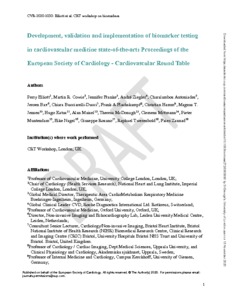Elliott, P;
Cowie, MR;
Franke, J;
Ziegler, A;
Antoniades, C;
Bax, J;
Bucciarelli-Ducci, C;
Flachskampf, FA;
Hamm, C;
Jensen, MT;
et al.
Elliott, P; Cowie, MR; Franke, J; Ziegler, A; Antoniades, C; Bax, J; Bucciarelli-Ducci, C; Flachskampf, FA; Hamm, C; Jensen, MT; Katus, H; Maisel, A; McDonagh, T; Mittmann, C; Muntendam, P; Nagel, E; Rosano, G; Twerenbold, R; Zannad, F
(2021)
Development, validation and implementation of biomarker testing in cardiovascular medicine state-of-the-art: Proceedings of the European Society of Cardiology - Cardiovascular Round Table.
Cardiovasc Res, 117 (5).
pp. 1248-1256.
ISSN 1755-3245
https://doi.org/10.1093/cvr/cvaa272
SGUL Authors: Rosano, Giuseppe Massimo Claudio
![[img]](https://openaccess.sgul.ac.uk/112592/1.hassmallThumbnailVersion/cvaa272.pdf)  Preview |
|
PDF
Accepted Version
Available under License ["licenses_description_publisher" not defined].
Download (697kB)
| Preview
|
Abstract
Many biomarkers that could be used to assess ejection fraction, heart failure, or myocardial infarction fail to translate into clinical practice because they lack essential performance characteristics or fail to meet regulatory standards for approval. Despite their potential, new technologies have added to the complexities of successful translation into clinical practice. Biomarker discovery and implementation requires a standardised approach that includes: identification of a clinical need; identification of a valid surrogate biomarker; stepwise assay refinement, demonstration of superiority over current standard-of-care; development and understanding of a clinical pathway; and demonstration of real-world performance. Successful biomarkers should improve efficacy or safety of treatment, while being practical at a realistic cost. Everyone involved in cardiovascular healthcare, including researchers, clinicians, and industry partners, are important stakeholders in facilitating the development and implementation of biomarkers. This paper provides suggestions for a development pathway for new biomarkers, discusses regulatory issues and challenges, and suggestions for accelerating the pathway to improve patient outcomes. Real life examples of successful biomarkers-high sensitivity cardiac troponin (hs-cTn), T2* cardiovascular magnetic resonance (CMR) imaging, and echocardiography-are used to illustrate the value of a standardised development pathway in the translation of concepts into routine clinical practice.
| Item Type: |
Article
|
| Additional Information: |
This is a pre-copyedited, author-produced version of an article accepted for publication in Cardiovascular Research following peer review. The version of record Perry Elliott, Martin R Cowie, Jennifer Franke, André Ziegler, Charalambos Antoniades, Jeroen Bax, Chiara Bucciarelli-Ducci, Frank A Flachskampf, Christian Hamm, Magnus T Jensen, Hugo Katus, Alan Maisel, Theresa McDonagh, Clemens Mittmann, Pieter Muntendam, Eike Nagel, Giuseppe Rosano, Raphael Twerenbold, Faiez Zannad, Development, validation, and implementation of biomarker testing in cardiovascular medicine state-of-the-art: proceedings of the European Society of Cardiology—Cardiovascular Round Table, Cardiovascular Research, Volume 117, Issue 5, 1 May 2021, Pages 1248–1256 is available online at: https://doi.org/10.1093/cvr/cvaa272 |
| Keywords: |
biomarker, ejection fraction, heart failure, magnetic resonance, myocardial infarction, pathway, troponin, Cardiovascular System & Hematology, 1102 Cardiorespiratory Medicine and Haematology |
| SGUL Research Institute / Research Centre: |
Academic Structure > Molecular and Clinical Sciences Research Institute (MCS) |
| Journal or Publication Title: |
Cardiovasc Res |
| ISSN: |
1755-3245 |
| Language: |
eng |
| Publisher License: |
Publisher's own licence |
| PubMed ID: |
32960964 |
| Dates: |
| Date |
Event |
| 2021-05-01 |
Published |
| 2020-09-22 |
Published Online |
| 2020-09-07 |
Accepted |
|
 |
Go to PubMed abstract |
| URI: |
https://openaccess.sgul.ac.uk/id/eprint/112592 |
| Publisher's version: |
https://doi.org/10.1093/cvr/cvaa272 |
Statistics
Item downloaded times since 13 Nov 2020.
Actions (login required)
 |
Edit Item |



